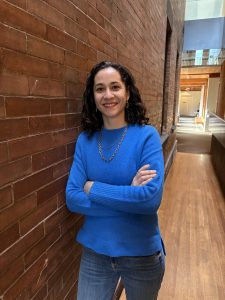
When people have been living under a censored, authoritarian regime for a long time, it’s hard for them to learn new information, but it is not impossible. That’s one of the lessons Ceren Baysan, Assistant Professor with the Department of Economics, has learned through her on-going research in Türkiye. Her work in the country is revealing nuances that suggest democracy in both Türkiye, and elsewhere, is less fragile than she once thought.
“In 2017, I conducted a study where I evaluated an information campaign delivered by one of the opposition parties,” Professor Baysan said. “The information was different than what people had been hearing and I found that the campaigns increased polarization. The average effect on vote share for the opposition was zero because it increased the opposition’s vote share in some places and decreased it in places where they were already weaker. This made me think, ‘Oh, wow, there’s nothing one can do.’ It would be like taking Russia and trying to give information to people on what’s happening in Ukraine. A lot of people don’t believe the information they’re receiving or they interpret it to fit their worldview.”
In contrast, Baysan and her co-authors have now discovered that how people integrate information is based in how they perceive the intention and objectivity driving the correction of misinformation.
“As a team we focused on conducting multiple focus groups and qualitative research. We piloted different types of messaging and information online, and it was clear that some information was viewed as partisan and some as more objective. One key factor is that the information needs to be perceived as objective and valued by the people,” she explained. “The premise of democracy is that people are expressing what they want but are well-informed. A lot of people think they’re well-informed, but they’re not. Another segment of people obviously just don’t care, but that’s a different story. This study shows that you can break that vicious cycle where someone’s convincing you that they’re better than they are, that democracy is healthier than it is, and that other facets of democracy are not valuable, with a simple informational message that states facts. This messaging can break the cycle in which an authoritarian regime stays in power.”
The results are found in the new working paper published by the National Bureau of Economics Research (NBER), Misperceptions and Demand for Democracy under Authoritarianism.
The field experiment engaged approximately 850,000 voters in Türkiye, about half of whom received the information materials about democracy and media independence that actual party volunteers delivered while canvassing door-to-door.
“We followed this methodology because we had certain neighborhoods that received the information campaigns, and others that did not,” Baysan explained. “By conducting the experiment at the neighborhood level, we could tie it to administrative data on vote share outcomes at the neighborhood polling location level, so we didn’t have to rely on self-reported data on how people voted, which is very sensitive, especially in this context. We also had a group of non-partisan volunteers who were not affiliated with any party. In the end, we found that this part of the research-based campaign was more effective, but not in a way that was statistically significant from the other campaigns. The canvassers anecdotally told us that the people who did the non-affiliated campaign enjoyed the experience because they felt like they could interact with someone who didn’t think they were just trying to persuade to vote a certain way or to take the information as a critique of the current regime.”
What matters to voters is that, in addition to the objective nature of the information, that it is well sourced and evidenced. Access to this kind of accurate information also has long-lasting effects.
“The accurate, research-based information was effective,” Baysan said. “That means people value good information and respond to it. The treatment effects were very large and persisted, not just until the campaign stopped two days before the presidential and parliamentary elections, but also 14 days later and even 10 months later into the local elections. People really updated their thinking about authoritarianism and acted accordingly, despite the fact that Erdoğan, the authoritarian leader, won the first election.”
Plans for further research include evaluating the same kind of misinformation correction campaigns outside Türkiye.
“In places like the US and Canada, people can also lose perspective because they’ve taken democracy for granted for so long,” Baysan said. “The open question is whether democracy is in these places is fragile too. If citizens don’t know how good what they have is, they can lose it without realizing what they’ve really lost.”
Return to the Department of Economics website.
Scroll more news.
